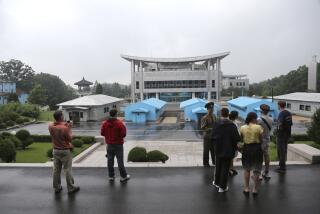German Doctor Wins a Reprieve From N. Korea
- Share via
BEIJING — A German doctor in North Korea to help an aid group rehabilitate medical facilities defied a deportation order Tuesday--and appears to have won a reprieve.
The North Korean government’s deportation notice apparently was punishment for taking a Times reporter and a few other Westerners on a tour of the capital, Pyongyang, during the visit last week by Secretary of State Madeleine Albright.
Dr. Norbert Vollertsen was nowhere to be found early Tuesday morning when North Koreans apparently arrived to take him to the airport. He had gone out at 6 a.m. “for a drive,” he said in a later telephone interview from Pyongyang. He returned home just after the flight took off at 9 a.m.
Officials had warned him Monday when they issued the order that he might face prison if he defied them. “They said, ‘Tomorrow you are illegal in our country, and when you’re illegal, we will take you to prison,’ ” Vollertsen said.
By late Tuesday, however, he was legal again. Vollertsen had won eleventh-hour permission to remain in the impoverished country, apparently because of appeals from the German government and media encouraged by the leader of his aid group, German Emergency Doctors. The North Koreans gave him a visa for three more months.
Vollertsen, 42, looks like the stereotype of a fading California surfer or ski bum with his shoulder-length streaked blond hair, casual attire and face ruddy from the elements. He received a special award, given for the first time to a foreigner, from the North Korean government for performing a graft with his own skin on a burn victim.
He also rescued a few journalists last week who were under the watch of official “minders,” or guides, leading them on a tour of a dingy hospital, a department store, the subway and the countryside, which were off limits to the visitors. Vollertsen’s sport-utility vehicle was tailed, though he tried to shake his followers.
The authorities assigned to the journalists were bothersome rather than sinister. They were unarmed and gave all indications of being what they said they were: university professors who spoke English and thus were chosen to monitor the journalists.
The minders seemed perplexed that reporters wanted to seize the opportunity of Albright’s visit to see everything they could in a land that seldom grants visas to U.S. journalists.
North Korean officials knew where Vollertsen had taken journalists before the newspaper accounts were published. A minder assigned to The Times’ reporter was summoned by his bosses last week to report on where his charge was. “She’s in the hotel,” he says he replied.
The bosses knew differently. “They knew where you were, but I didn’t,” the minder sullenly told the reporter last week.
On Monday, Vollertsen was summoned by authorities and harshly reprimanded for “counterrevolutionary activities,” the doctor said.
“North Korea accused me of acting against the rules of the Democratic People’s Republic of Korea,” he said. “They said I was acting against the medical profession, that I behaved like a politician or a journalist, like a counterrevolutionary.”
The officials’ main charge seemed to be that Vollertsen had entered the hospital and showed reporters a garbage can. (Vollertsen did not show reporters a garbage can; rather, he pointed out decades-old equipment, appalling sanitary conditions and wires stretched across wet floors.)
“I said, ‘When I see children starving, and I can only take care of the symptoms [for patients] in a few hospitals, I have to look for the reasons in the whole system,’ ” Vollertsen said he told officials. “The main thing is to get money in [in the form of donations] and to open the country, and thus I have to make political activity.”
Vollertsen and the founder of German Emergency Doctors, Rupert Neudeck, feverishly made calls all Monday night to German journalists and politicians. A senior German delegation happened to be in Pyongyang to meet with North Korean officials about the prospect of establishing diplomatic relations. Vollertsen and Neudeck warned North Koreans that kicking out a German aid worker would not look good.
By the next afternoon, Vollertsen was told that his visa had been extended.
He believes the event is a small victory for human rights in North Korea. “Maybe it was the first test,” he said. “It is a victory for the mass media.”
More to Read
Sign up for Essential California
The most important California stories and recommendations in your inbox every morning.
You may occasionally receive promotional content from the Los Angeles Times.













